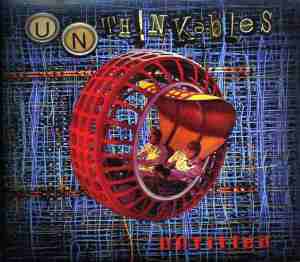
Louder than what?
I totally thought that ‘Volcano Rock’ was released first, ‘Only Want You For Your Body’ second and ‘Dead Forever’ third, but problems with accepting this as the actual release order arose when I looked on the sleeve of Volcano Rock and I saw the directive ‘Play This Album Even Louder!’ and I was like huh? But there’s nothing to compare itself with! Then on the third and final album ‘Dead Forever’, the band demands ‘Play this Album Loud!’ and I’m thinking gee, these guys are screwy.
Eventually I worked out that album orders aren’t always going to be in the same order that the label reissues them (for the record and the sake of consistency: the third and final album ‘Only Want Your For Your Body’ says ‘Now Blow Your Speakers Out!’). Anyway, here’s the order in its factual glory:
Dead Forever, 1972
Volcano Rock, 1973
Only Want You For Your Body, 1974
When the committee for assembling the hard rock pantheon of excellent greats is set-up, they would be ill-considered and sneered at if they overlooked the considerable power of Oz rockers Buffalo. Fronted by the always grinning, baby-faced Dave Tice (whose blinding white teeth could have well-served a Colgate ad) Buffalo hammered out three hard-hitting albums before calling it a day.
Not his God, not her God, not your God, but My God!, ‘Volcano Rock’ is really hot and really solid. I think the sucker goes off. “Cock Rock that thuds on the hard floor like a heavy bag of cement, hardening. Totally hardened it can be an effective wrecking instrument.” I wrote that down the first time I heard ‘Volcano Rock’, by far the hardest metal these doggone ears ‘ave ‘eard aroun’ ‘ese parts. I couldn’t believe my ears, frankly it was too loud to.
Next I heard ‘Only Want You For Your Body’ and it wasn’t very good, or at least I thought it wasn’t, but I was wrong. Don’t be put off by the most heinous album cover art that you will ever see because I probably was and thus paid dearly for it. The cover art is the second-best reason not to get it on vinyl and the first reason is the songs have been so acutely remastered by Aztec that the best versions that exist are now these ones.
What bites if you choose the newies is you can’t see the Vertigo disc spinning around hypnotically on your turntable anymore. As far as I know, Buffalo were the only Australian act signed to Vertigo, the UK label who peddled the crunch back in the day when things started to get really weird. In addition to having all the really heavy stoner rock like Black Sabbath and May Blitz they had black and white vertigo vinyl. But at least the folks at Aztec have restored this neat feature on the reissues. Look at the plastic and you’ll see what I’m getting at.
The critic in me wants to say ‘Volcano Rock’ was a refreshing move away from blues rock to Sabbath changes, but it’s not correct. Buffalo were fully formed from the first detonation of John (Should be a Household Name, Should have Had a Funny Nickname) Baxter’s thunder chords, the heavyweight behind the sound, while Dave Tice did the lyrics.
‘Intro: Pound of Flesh’ proves that Dave was a funny fucker. You’re probably asking yourself why this is and now I’m going to tell you. It was no album intro, it was the 5th song! Funny. I’m always putting this cut on mix-CDs and I really need to stop because people are starting to get it more than once and that’s not only lame it’s kind of senile. If the cookie monster could belt it out and hold a note and was also a woman, he would sound something like Dave. Dave is offered insurance on Sunset Strip. A crucial ingredient in heavy rock is the (pardon me while I steal a catchphrase from America’s Next Top Model) fierce bottom-end and these guys are amphibious (they swam through the muck with élan). ‘Freedom’ was a hard rock epic on a hard rock warm-up mix that the Jicks used a few years ago and one in which I pried from the hands of their drummer after bamboozling him after one of their shows. I think one of the Matador guys had given it to him, it was full of a whole lotta stuff I never ‘eard before: Amon Dull II, Pink Faeries, Taste, Woods Band, Hairy Chapter among others.
‘Only Want you For Your Body’s’ cover art is so revolting I’m not even going to discuss it anymore, except to say that Spinal Tap’s ‘Smell the Glove’ doesn’t even come close. Buffalo obviously spent a lot of time on their cover art but I think that it’s one of the least interesting aspects of the group. These bovine beasts sometimes needed to be bowdlerised.
I heard ‘Dead Forever’, their debut, most recently. ‘Leader’ starts things off and in its epic way alludes to everything the band will get up to in the next few years. Bill Palbi’s drums are amazing and kinda damp, they’re lubed-up with some kind of treatment, or drumming aide, it’s kind of fresh (Bill would soon be replaced). ‘Pay My Dues’ is Baxter’s ‘Eruption’ – followed by the ten and a half minute ‘I’m a Mover’ which is proto-Van Halen tenfold, Tice at times shrieking like David Lee Roth or Jack Black. At the seven minute mark upon reaching the climax of another big Baxter freestyle, someone pipes up: ‘very tasty.’
Clueless and rich scamps Wolfmother should have had a knowledge of Buffalo before they embarked on their unsatisfying banshee music. Calling the band Son of Buffalo, or even Son of Buffalomother (son of Bisonmother probably rings the best without undermining the integrity of the salutary context) I reckon would have enhanced their image.
There’s a lot of talk about why Baxter left the band. He thinks it’s because he played too loud and Dave couldn’t hear himself think, let alone bellow his stentorian pipes, but apparently it was a record company push to stretch the band’s market. Gagworthy to the extreme why some bands frigging do this.
 Certainly the names of Roger Grierson and Phil Judd are two you would tend never to have expected to see in the same place and the same time, though both men first came to prominence in the mid (for Judd) to late (for Grierson) 1970s, as members of Split Enz and the Thought Criminals respectively. Judd’s best-known moment is The Swingers’ ‘Counting the beat’, and Grierson doesn’t have one, though his career as a musician, manager, record company exec, music publisher, CEO and everything else is diverse and by certain gauges you could blame him for the careers of Tex Perkins and Caligula (the band), none of which, Thought Criminals included, should or would make anyone want to listen to music he was producing in 2009. In fact, ditto Phil Judd who has been exceptionally quiet in the last 20 years – you hear more about Phil Judd in songs Tim Finn writes about him than you do from Phil Judd himself.
Certainly the names of Roger Grierson and Phil Judd are two you would tend never to have expected to see in the same place and the same time, though both men first came to prominence in the mid (for Judd) to late (for Grierson) 1970s, as members of Split Enz and the Thought Criminals respectively. Judd’s best-known moment is The Swingers’ ‘Counting the beat’, and Grierson doesn’t have one, though his career as a musician, manager, record company exec, music publisher, CEO and everything else is diverse and by certain gauges you could blame him for the careers of Tex Perkins and Caligula (the band), none of which, Thought Criminals included, should or would make anyone want to listen to music he was producing in 2009. In fact, ditto Phil Judd who has been exceptionally quiet in the last 20 years – you hear more about Phil Judd in songs Tim Finn writes about him than you do from Phil Judd himself. You may recall the absurd joke a journalist for The Australian played on… who? … a few years ago by sending extracts from Patrick White books to publishers who (a) did not recognise them as White and (b) rejected the work in various ways. What this was supposed to prove is anyone’s guess – like a lot of literary hoaxes, there was some kind of underlying assumption that no-one actually holds if they think about it for more than a minute.
You may recall the absurd joke a journalist for The Australian played on… who? … a few years ago by sending extracts from Patrick White books to publishers who (a) did not recognise them as White and (b) rejected the work in various ways. What this was supposed to prove is anyone’s guess – like a lot of literary hoaxes, there was some kind of underlying assumption that no-one actually holds if they think about it for more than a minute. 
